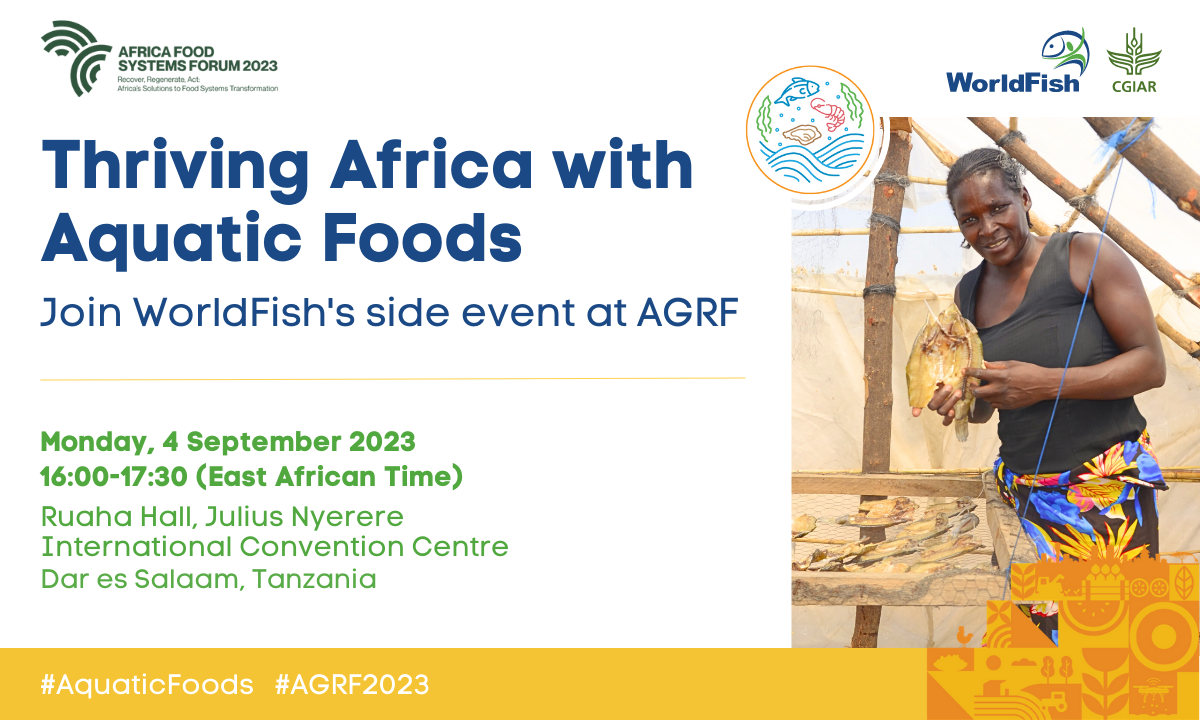The world needs to establish food and nutrition security for millions of people facing hunger in Africa, crucial for the sustainable socio-economic development and the long-term prosperity of the continent. Malnutrition is particularly severe in sub-Saharan Africa, with almost a quarter of its population undernourished. Sustainably increasing the supply of aquatic foods could make them affordable enough to prevent some 166 million micronutrient deficiencies around the world by 2030.
The event will convene voices from Zambia to Kenya to spotlight the crucial role and opportunity aquatic foods offer to sustainably ramp up nutritious food production. The dialogues and discussions will also address the bottlenecks and real-world solutions to unleashing their untapped potential in ending hunger and malnutrition and creating new income streams for Africa’s people.
Event Title: Thriving Africa with Aquatic Foods
Date: Monday, 4 September 2023
Time: 16:00 pm- 17:30 pm (East African Time)
Location: Ruaha Hall, Julius Nyerere International Convention Centre, Dar es Salaam, Tanzania
Challenges to increasing aquatic foods production in Africa
Africa severely lags behind other regions in developing its aquatic food production, consumption, and trade share. The supply chain continues to be threatened by the lack of better fish breeds and more varied fish feeds, in addition to technical training, limited research capacity, insufficient financial and human resources, and limited market infrastructure and access. This is observed to potentially restrict the capability of African governments to safeguard the sustainability and profitability of the industry, despite the enormous potential of the industry.
Big facts on aquatic foods in Africa:
With a water body 3 times the landmass of the African continent, and its vastly untapped potential, fish and other aquatic foods offer a unique opportunity to sustainably achieve healthy, nutritious diets for the projected 2.4 billion African people by 2030, along with improving livelihoods, especially among coastal communities, women, and youth. Sustainably produced aquatic foods can also lower the overall environmental impact from food production as they have a smaller carbon footprint compared to crops and livestock. Therefore, aquatic foods have a crucial role to play in addressing food, nutrition, and income security in a changing climate for a thriving Africa in the 21st century.
-Fish and other aquatic foods represent a major source of protein and micronutrients for nearly 400 million Africans
-By 2030, it is estimated that the demand for fish and aquatic foods will rise by 30% in Africa because of the rising costs per capita of income and population
-As of 2011, fisheries and aquaculture have contributed approximately US$24 billion (1.3% of the continent's GDP) to the African economy
-Currently, the sector employs over 12 million people, with 58% working in production and 42% in post-harvest processing
-More than 90 percent of women in the African fisheries and aquaculture sector earn their livelihoods in post-harvest work
Invited Speakers:
-Victor Siamudaala, Country Lead, WorldFish, Zambia and Southern Africa
-Alexander Kefi, Project Coordinator, PROFISH Blue, SADC Secretariat & Former Director, Department of Fisheries, Zambia
-Margaret Nakato, Coordinator, Katosi Women Development Trust & World Forum of Fish Harvesters & Fish Workers, Uganda
-Mercy Matuma Hamisi, Master's Student, University of Nairobi, Kenya
Moderator:
-Rahma Adam, Social, and Economic Inclusion Scientist, WorldFish, & Focal Point, East & Southern Africa Regional, OneCGIAR Initiative
Stay up to date with the latest information by following WorldFish and the hashtag #aquaticfoods to join the dialogue on Twitter.
